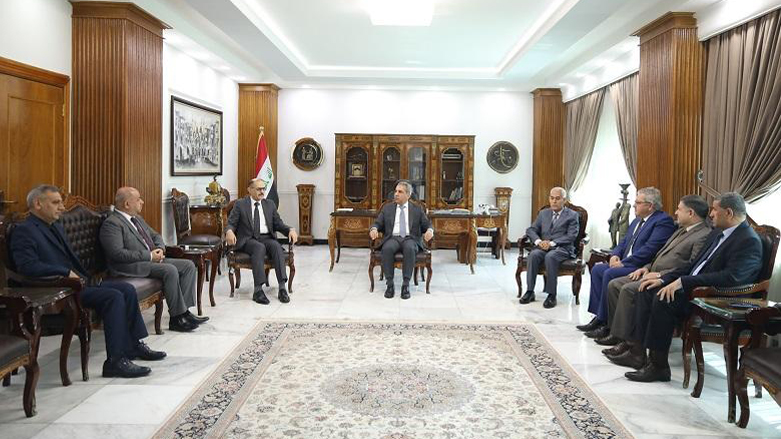Iraqi Supreme Judicial Council and Federal Court suspend their work due to Sadrists’ protest
“Sadr might suspend the work of the committee overseeing the protests in exchange for the suspension of the judiciary and courts’ work.”

ERBIL (Kurdistan 24) – The Iraqi Supreme Judicial Council and the Federal Court urgently met early Tuesday and decided to suspend the work of the Supreme Judicial Council, the courts affiliated with it, and the Federal Supreme Court in reaction to the protests of the Sadrists outside the Supreme Judicial Council’s building.
“Following the protests held outside the Supreme Judicial Council’s building and sending threatening messages via phone to pressure the court to dissolve the parliament, we decided to suspend the work of the Supreme Judicial Council, the courts affiliated with it, and the Federal Supreme Court,” read a statement by the Supreme Judicial Council.
The statement warned that “these behaviors are unconstitutional and illegal” and that “the council holds the government and the political party behind this sit-in legally responsible for the consequences of this behavior.”
“Karkh Investigation Court issued an arrest warrant against the leading member of the Sadr movement, Sabah Al-Sa’idi, for the crime of threatening the judiciary,” the Supreme Judicial Council said in a separate statement on Tuesday.
Following the arrest warrant, Al-Sa’idi affirmed in a tweet that “he will not be silent about corruption and injustice and is not afraid of imprisonment and arrest.”
فداءً للصدر من مصلحِ
— صباح الساعدي (@sabah_Alsaaedy) August 23, 2022
حفيد الحسين له منحري
الفخر كل الفخر ان اكون
ان اول شخص من الشعب
الثائر في ثورة عاشوراء
( وانا اقلهم شئنا )
تصدر ضده مذكرة اعتقال
من السلطات الحاكمة
وذلك لن يكمم صوتي ابدا
#لن_نركع_الا_لله#ثورة_محرم_مستمرة pic.twitter.com/4apbPQUiqQ
Followers of the Sadrist Movement leader Muqtada al-Sadr installed protest tents outside the Iraqi Supreme Judicial Council in Baghdad early Tuesday.
Hundreds of Sadr’s supporters gathered outside the Supreme Judicial Council in the early hours of Tuesday, starting another protest similar to the one outside the parliamen building.
Read More: Sadr’s followers install protest tents outside Iraqi Supreme Judicial Council
The Shiite Coordinating Framework, in a statement on Tuesday, denounced the protest of the Sadrist followers outside the Supreme Judicial Court and held the government responsible for protecting the government institutions and the government employees.
“We are not ready to hold any dialogue with the Sadrist Movement before ending the protests in front of the government’s institutions,” read the Coordinating Framework’s statement.
Head of Asa'ib Ahl al-Haq militias Qais Al-Khazali, a prominent member of the Shiite Coordinating Framework, criticized the Sadrists’ protest in front of the Supreme Judicial Court.
“We reject trespassing on the judicial institution that must be distanced from the political conflicts,” tweeted Al-Khazali on Tuesday. “The street card should not be used to pressure the court to make decisions for the benefit of political parties.”
— قيس الخزعلي (@Qais_alkhazali) August 23, 2022
Iraq’s president Barham Saleh in a statement published on Tuesday, warned that the developments of events in the country call on everyone to abide by calm and prevail over the language of dialogue and to ensure that it does not slip into unknown and dangerous labyrinths.
Iraqi Prime Minister Mustafa Al-Kadhimi cuts short his visit to the Arab Republic of Egypt and returns to Baghdad in light of recent developments in the country and to follow up directly on the work of the security forces in protecting the institutions of the judiciary and the state, the state media reported on Tuesday.
“Peaceful demonstration and expression of opinion is a constitutionally guaranteed right, but disrupting the work of the judicial institution is a serious threat to the country, and work should be done to protect the judicial institution, its prestige, and independence, and to deal with demands by legal and constitutional frameworks,” read Saleh’s statement.
Saleh Mohammed, known as the leader’s minister, the right hand to the Sadrist movement leader Muqtada al-Sadr announced that Sadr had decided that he would not get involved in the affairs of the demonstrations.
“Sadr might suspend the work of the committee overseeing the protests in exchange for the suspension of the judiciary and courts’ work,” tweeted Mohammed on Tuesday.
— وزير القائد - صالح محمد العراقي (@salih_m_iraqi) August 23, 2022
Mohammed Al-Halbousi, Speaker of the Iraqi parliament, on Tuesday “called for returning to the constitution and being responsible for getting the country out of this crisis.”
“Unfortunately, what we have come to today is a step backward,” tweeted Al-Halbousi
— محمد الحلبوسي (@AlHaLboosii) August 23, 2022
In a related development, the United Nations Assistance Mission for Iraq (UNAMI) noted that “the State institutions must operate unimpeded in service of the Iraqi people, including the Supreme Judicial Council.”
“The right to peaceful protest is an essential element of democracy,” tweeted UNAMI on Tuesday. “Equally important is the assertion of constitutional compliance and respect for state institutions.”
The right to peaceful protest is an essential element of democracy. Equally important is the assertion of constitutional compliance and respect for state institutions. State institutions must operate unimpeded in service of the Iraqi people, including the SJC.
— UNAMI (@UNIraq) August 23, 2022